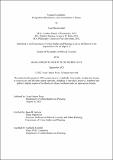Migrant Capitalism: Emigration, Remittances, and Urbanization in Punjab
Author(s)
Meer, Ayan Hassan
DownloadThesis PDF (14.17Mb)
Advisor
Jackson, Jason B.
Terms of use
Metadata
Show full item recordAbstract
This dissertation addresses a classical question in the social sciences: how does capitalism relate to international emigration, and conversely, how does emigration shape the form capitalist development takes in a given polity? To answer this question, this dissertation employs extensive archival and field-based research, as well as geospatial analysis, drawing on a number of empirical cases centered in or related to the Indian state of Punjab. This region, in fact, concentrates the extreme inequalities of India’s recent development. On the one hand, some of the wealthiest regions in the country, buoyed by remittances from the diaspora, but also an agrarian economy in decline, as the 2021 historic protests have attested to. Punjabi farmers, once perceived as the favored beneficiaries of state-led development policies, are now ensconced in a social and ecological crisis with falling incomes, high levels of indebtedness and frequent crop failures, in the context of India’s uneven urbanization.
To conceptually systematize the type of political economy borne out of these emerging migrations, this dissertation contributes to literature in development studies and geography by introducing the concept of “migrant capitalism”—construed in three distinct yet related typologies. In the first instance, it refers to the super-exploitation of immigrant workers, in labor and accumulation regimes where severe wage compression is the only way to protect profitability from market risks and environmental uncertainty. Secondly, migrant capitalism addresses the entrepreneurial strategies of migrants, who use emigration and the consequent remittances to diversify their income and/or invest, given the increased liberalization of capital flows across the Global South. Finally, migrant capitalism attends to the accumulation strategies of migration industries, the firms and “migration infrastructures” that facilitate emigration, and whose geographical distribution in Punjab belies specific territorial production complexes as part of its urbanization trajectory.
Date issued
2023-09Department
Massachusetts Institute of Technology. Department of Urban Studies and PlanningPublisher
Massachusetts Institute of Technology